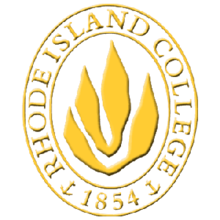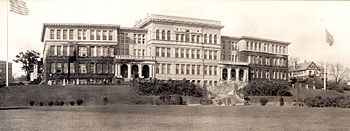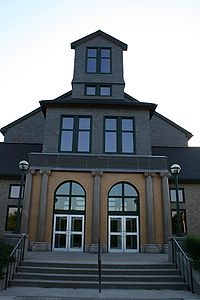- Rhode Island College
-
- This article is about the current institution that has used this name since 1960.
For the institution that used this name from 1764 until 1804, see Brown University.
Rhode Island College 
Established 1854 Type Public Endowment $16.4 million[1] Students 9,000 Location Providence, Rhode Island, United States Campus Suburban, 180 acres (688,000 m²) Website http://www.ric.edu/ Rhode Island College (RIC) is a nationally ranked, coeducational, state-supported comprehensive college founded in 1854, located in Providence, Rhode Island, USA. Rhode Island College is the oldest of the three public institutions of higher education that operate under the aegis of the Board of Governors for Higher Education; the two other institutions are the University of Rhode Island and the Community College of Rhode Island.
Contents
History
Rhode Island College was first established as the Rhode Island State Normal School by the Rhode Island General Assembly in 1854.[2] Its creation can be attributed to the labors of Henry Barnard, the first state agent for education in Rhode Island who had established the Rhode Island Teachers Institute at Smithville Seminary in 1845, and his successor, Elisha Potter. Rhode Island State Normal School was one of the nation's first normal schools (teacher preparatory schools), which grew out of the humanitarian groundswell of the mid-19th century spurred by educational missionaries like Horace Mann. The school attracted hard working young people who came chiefly from ordinary backgrounds, who wanted to teach and who had no other way of preparing themselves.
Not yet thoroughly convinced of the school's value, the General Assembly curtailed its financial support in 1857 and the school was moved to Bristol where it lingered until 1865 before closing. However, in 1869, the newly appointed state commissioner of education, Thomas W. Bicknell, began a vigorous personal campaign to revive the school.[3] His efforts were rewarded in 1871 when the General Assembly unanimously voted a $10,000 appropriation for the school's re-opening in Providence.
Renamed the Rhode Island Normal School, the institution settled into a period of steady growth punctuated by periodic moves to larger quarters.[4] The general favor won by the school after its first difficult years had passed and was confirmed in 1898 when it moved into a large building specially constructed for it on Providence's Capital Hill near the State House (this space is now occupied by the Providence Place mall).
At first, the Rhode Island Normal School offered admission to both high school graduates and non-graduates, with high school graduates expected to complete their studies in one year. However, by 1908 the program had been lengthened to two and a half years and restricted to high school graduates.
In 1920, the Rhode Island Normal School was renamed Rhode Island College of Education by order of the General Assembly, the college now offering a four year program which upon completion one would receive a Bachelor of Education degree. At this time the observation school, which dated back to the 1890s, was renamed the Henry Barnard School. The college's graduate program also originated in the early 1920s and the first master's degrees were conferred in 1924.
For the next three decades the college remained a small, teachers' college with a student body of four to six hundred men and women, most of whom went on to teach in the elementary and junior high schools of the state. Early in the 1950s that calm was shattered by intense debate that arose over the college's role in the state system of higher education and for a time serious doubt was cast on its continued existence. There were plans to merge the institution with Rhode Island's other four year college, the University of Rhode Island. After careful consideration, the Board of Trustees of State Colleges decided to keep the college independent and strengthen it overall.
In 1958, the college was moved to its current campus in the Mount Pleasant section of Providence. In 1959, the Rhode Island Commission to Study Higher Education recommended the development of the institution into a general college which was approved by the General Assembly. Reflecting the broadening of purpose, the institution's name was changed for the final time to its current name Rhode Island College in 1959.[2]
The East Campus includes the former grounds of the Rhode Island State Home and School, the first post-Civil War orphanage in the country. In recent years, many efforts have been undertaken by Rhode Island College and its benefactors to preserve Nina's House (formerly known as the Yellow Cottage or Cottage C), one of the original structures from the State Home.
Academics
The academics at Rhode Island College received national recognition in 2011 when Forbes Magazine ranked the college the 571st best college out of the 3,000 plus colleges and universities in the United States. Academic programs at Rhode Island College are divided into five colleges: the Faculty of Arts and Sciences, the Feinstein School of Education and Human Development, the School of Management, the School of Nursing, and the School of Social Work. These schools offer more than 90 undergraduate and 30 graduate programs for students. Rhode Island College is accredited by the New England Association of Schools and Colleges. Among the five colleges, individual departments have received additional accreditation from the following associations: Council on Social Work Education, National Association of Schools of Art and Design, National Association of Schools of Music, National Association of State Directors of Teacher Education and Certification, National Council for Accreditation of Teacher Education, and the Commission on Collegiate Nursing Education.
The James P. Adams Library is the main library serving the entire community in support of teaching and learning. Students, faculty, staff and the community have access to a wide variety of knowledge resources including electronic reference resources, e-books, databases, audiovisual materials, and special collections. The library is also the academic, social, and intellectual center of the campus, hosting a variety of lectures, exhibits and performances to the benefit of the campus community.
Students and faculty
With an enrollment predominantly from Rhode Island and nearby Massachusetts and Connecticut, the institution historically has served as a "College of Opportunity" for first-generation college students.
66% of the student body are full-time students.
67% of enrolled students are female, and 33% of enrolled students are male
President
Nancy Carriuolo is the ninth president of Rhode Island College. The president is the chief executive officer of the College and is responsible for the success of the College's mission in providing superior academic programs and research. The previous president, John Nazarian, who was associated with the College for more than fifty years, retired from the presidency at the end of the 2007-2008 academic year.[5] Prior to 1920, the chief academic officer of the College was known as the principal.
President Years in Office John Lincoln Alger[6] 1920–1940 Lucius Albert Whipple[7] 1940–1951 William C. Gaige 1952–1968 Joseph Kauffman 1968–1973 Charles B. Willard 1973–1977 David E. Sweet[8] 1977–1984 Carol J. Guardo[9] 1986–1989 John Nazarian[10] 1990–2008 Nancy Carriuolo 2008–present Notable graduates
Justine Mainville, keyboardist, drummer, singer and merch girl for Math the Band.
Robert Gonzalvez, the first Hispanic judge in the history of Rhode Island, graduated in 1975. [11]
James Langevin, 2nd District Congressman from Rhode Island, was a graduate of Rhode Island College, majoring in public administration. Langevin also served as President of Student Community Government, Inc., during his undergraduate career at the college.
Ron McLarty, a noted television actor and novelist, is a graduate of the College; in 2007, he was the featured speaker at commencement, and was awarded an honorary degree.
Viola Davis, a Tony Award winning and Academy Award nominated actress. In 2001, she was awarded the Tony Award for Best Featured Actress in a Play for her work in King Hedley II. In 2009, she was nominated for a Best Supporting Actress Oscar for her role in the film Doubt, and in 2010 she won a Tony Award for "Fences".
Annie Smith Peck, a pioneering woman educator and mountaineer, graduated from the college when it was still known as the Normal School.
Peter Boyer is one of the most frequently performed young American orchestral composers. His work Ellis Island: The Dream of America for actors and orchestra was nominated for a Grammy Award for Best Classical Contemporary Composition in 2006.
James Macomber, novelist, author of internaional legal thrillers "Bargained for Exchange", "Art & Part", "A Grave Breach", "Sovereign Order". As a RIC undergraduate, Macomber was president of the freshman and sophomore classes, was elected President of the Student Senate in his junior year, and as a senior was the first student to be named to the College Council.
Sharon Ellen Burtman, 1995 US Women's Chess Champion.
Hugh Leonard, Irish playwright, screenwriter, and columnist, was awarded an honorary Doctor of Humane Letters degree in 1980. [12]
Sandeep Joshi, James Thibault, Keith Kaplan, David Ouellette, James Della-Selva, Robert Tsang, Lorraine Levin and Edward Gonsalves, members of the 1985 Pan Am Intercollegiate and National Champion chess club. RIC replaced Columbia University as the new National Champion in 1985 by defeating Rutgers, Michigan, Baruch College, Ohio State, Northwestern and Harvard. RIC also routed Canadian National Champion University of Toronto 4-0 to become the 1985 Pan American Intercollegiate Team Chess Champion.
Campus life
There are 19 varsity sports, 6 in the fall, 6 in the winter, and 7 in the spring. RIC is primarily a commuter school; its six residence halls house 1194 students.
Student activities and clubs on campus are governed and funded by Student Community Government, Inc., a semi-autonomous organization financed by the college's student activity fee, consisting of an executive board, parliament, and several committees. Notable amongst several dozen organizations is the campus radio station, WXIN (FM), which has been on air since 1979,[13] and the Anchor newspaper, a weekly student-run and operated paper published since 1928.
Rhode Island College has recently seen an increase in Greek life on campus. The Greek Council has been reformed, as it now consists of three fraternities and three sororities. Fraternities at Rhode Island College include national groups Kappa Delta Phi, Iota Phi Theta, and local group Omega Kappa Rho. Sororities at Rhode Island College include local groups Zeta Xi Delta, Sigma Iota Theta, and Lambda Chi.
Other active clubs on campus include Rhode Island College Ice Hockey, Rhode Island College Programming, Students for Justice in Palestine, Future Elementary Education Teachers, Biology Club, Organization of African Students and Professionals in the Americas, Harambee, Anchormen Rugby, Anchorwomen Rugby, Intervarsity Christian Fellowship, Latin American Student Organization, NSSLHA, Anchor TV, Rhode Island College Ballroom Dance Club, and the English Club. As of September 2009, there are 71 clubs on campus considered "active" by Student Community Government, Inc.
A new $30 million, energy efficient, LEED-certified residence hall (simply called "New Residence Hall" for now) opened for the fall semester of 2007. The 125,000-square-foot (11,600 m2) building expanded the institution's existing housing capacity by 44%.[14]
RIC also has a Campus Ministry in the lower level of Donovan Dining Center, next door to the Unity Center. The ministry is non-denominational with many religions, ethnic groups, and academic concentrations represented.
The college's Music, Theatre and Dance department has a strong presence on campus. Tickets to performances are offered to students at a discounted rate.
References
- ^ As of June 30, 2009. "U.S. and Canadian Institutions Listed by Fiscal Year 2009 Endowment Market Value and Percentage Change in Endowment Market Value from FY 2008 to FY 2009" (PDF). 2009 NACUBO-Commonfund Study of Endowments. National Association of College and University Business Officers. http://www.nacubo.org/Documents/research/2009_NCSE_Public_Tables_Endowment_Market_Values.pdf. Retrieved February 6, 2010.
- ^ a b About RIC - History
- ^ NEA: Luminaries, NEA History, Leaders
- ^ Rhode Island Colleges
- ^ News and Events
- ^ Rhode Island College Sesquicentennial
- ^ I25511: Alva Jerome Vincent (14 Jul 1868 - 9 Mar 1905)
- ^ "Dr. David E. Sweet, 51, Dies; Head of Rhode Island College". The New York Times. September 18, 1984. http://query.nytimes.com/gst/fullpage.html?res=9F05E3D6163BF93BA2575AC0A962948260. Retrieved May 22, 2010.
- ^ "College President Named". The New York Times. October 20, 1985. http://query.nytimes.com/gst/fullpage.html?res=9B0CEFDE1F39F933A15753C1A963948260. Retrieved May 22, 2010.
- ^ http://www.ric.edu/about/office_bio.htm
- ^ http://www.ric.edu/ric150/historicalTodayArchive02.php?id=4
- ^ http://www.ric.edu/ric150/historicalTodayArchive02.php?id=41
- ^ http://www.ricradio.org/stationhistory.htm
- ^ http://www2.ric.edu/news/displayNews.php?id=news-483
External links
- Rhode Island College
- History of the Rhode Island Normal School (1911)
- State Home and School Project
- The Anchor
- James P. Adams Library
Little East Conference Full members Eastern Connecticut Warriors • Keene State Owls • Plymouth State Panthers • Rhode Island College Anchormen • UMass Boston Beacons • UMass Dartmouth Corsairs • Southern Maine Huskies • Western Connecticut Colonials
Associate members Bridgewater State Bears • Fitchburg State Falcons • Framingham State Rams • Salem State Vikings • Westfield State Owls • Worcester State Lancers
Colleges and universities in Rhode Island Public institutions CCRI · Naval War College · Rhode Island College · University of Rhode Island
Private institutions Brown · Bryant · Johnson & Wales · New England Tech · Providence · RISD · Roger Williams · Salve Regina
Professional schools Coordinates: 41°50′32″N 71°27′40″W / 41.842199°N 71.461161°W
Categories:- Public universities and colleges in Rhode Island
- American Association of State Colleges and Universities
- Educational institutions established in 1854
- Universities and colleges in Providence, Rhode Island
- New England Association of Schools and Colleges
- This article is about the current institution that has used this name since 1960.
Wikimedia Foundation. 2010.


